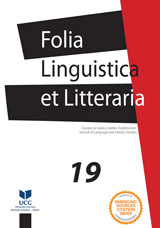TOWARDS A RENAISSANCE IN HISTORY TEACHING
TOWARDS A RENAISSANCE IN HISTORY TEACHING
Author(s): Lejla MulalićSubject(s): Comparative Study of Literature, History of Education, Theory of Literature, British Literature
Published by: Filološki fakultet, Nikšić
Keywords: educational reform; historical fiction; history teaching; Jim Crace; metahistorical approach; New Historicism; Norman Davies; postmodernism;
Summary/Abstract: History teaching has been the subject of vigorous discussion and painstaking reform in Britain since the late 1980s with the aim of creating a more culturally and methodologically inclusive vision of history that would acknowledge Britain‘s composite identities and see history as value-laden. This paper will explore the ways in which the process of historical interpretation may be allowed to challenge the dominance of the fact-oriented empirical approach in the context of the history classroom, with a special emphasis on the obligatory but unattractive survey history courses at English Departments. Furthermore, it will unravel the spectre of postmodernism looming over the process of history teaching in order to show to what extent postmodern reading strategies and more traditional approaches intersect and inform one another in history classes. To illustrate my idea of the rebirth of history in the above mentioned context I will look into Norman Davies‘ approach to prehistoric Britain in his textbook The Isles (1999) and the possibility of using a work of historical fiction, such as The Gift of Stones (1988) by Jim Crace, as a teaching tool in the discussion of Stone Age Britain. Assuming that the practice of history is necessarily accompanied by theory, which may be demystified and successfully adapted for the history classroom, and granting that ‗‘if historical fiction is not always history, … it is always historiography‘‘ (Teo 312), I will advocate a metahistorical turn in history teaching because it enables students to gain a fuller understanding of the ways in which all historical explanations, including their own interpretations, are constructed and narrated.
Journal: Folia Linguistica et Litteraria
- Issue Year: 2017
- Issue No: 19
- Page Range: 137-152
- Page Count: 16
- Language: English

